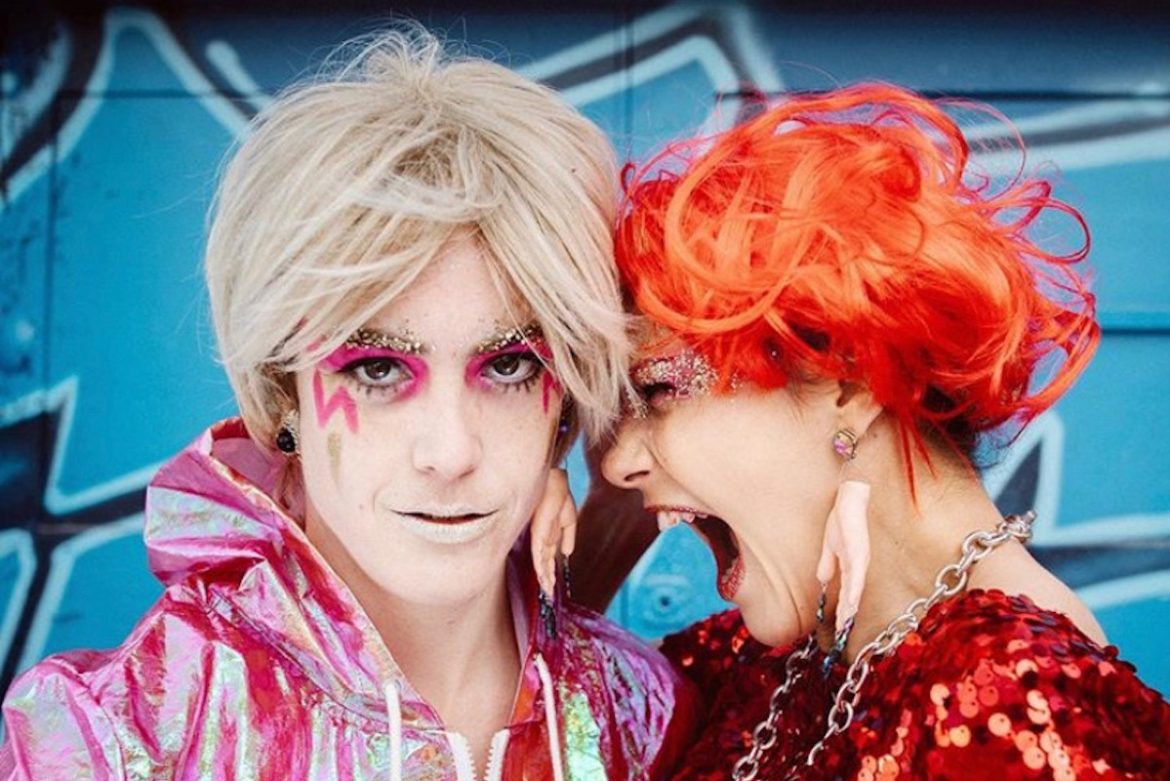Ellen Grimshaw’s polyvocal Just Us Girls – What’s a Girl? reminds Robert Reid of Samuel Beckett. And Blondie
Something about Just Us Girls, What’s A Girl? reminds me of Mork and Mindy. There’s a quality in Ellen Grimshaw’s stiff-limbed, wildly gesticulating, grimacing nameless character that says alien, or maybe robot: extreme intelligence struggling to contain itself within a rudimentary human body, flesh and blood and bone too limited a mechanism for expression.
Proceeding by a series of scenes separated, I think, by lighting shifts, vocal interpolations and choreographed high energy dance/aerobics routines, Just us Girls, What’s a Girl? begins with the question posed in the title. Grimshaw – her shocking red hair in a severe bob, a lairy yellow bolero, red tutu, chunky black boots, an armoured chest plate of golden glitter, sneer and wild eyes – commands the stage from the beginning like a glam rock fascist. Everything about her is sharp, defined and coursing with energy.
By contrast, her foil is Dickshirt (Alice Stewart). They lumber around the stage, their posture sagging, in a boof-head blond wig and goofy expression, wearing white shorts and t shirt with dicks drawn all over them. In Dickshirt’s hand is a large, rubbery phallus that he uses to point, emphasise and threaten.
Grimshaw is a being of galactic consciousness, a flailing creature fallen through from another dimension, and the little egos and existentialisms of humans, especially humans as blunt and disappointingly dull as Dickshirt, baffle her. Her glamour contrasts with the dumpily masculine Dickshirt and the empty stage. Grimshaw’s philosophy pours forth, a maelstrom of clichés and symbols of patriarchy and feminism.
A parody of contemporary gender politics is played out from scene to scene, scathing of all sides. Dickshirt asks what Grimshaw is, and she replies just a girl (or maybe, me? Oh, I’m just a girl – I don’t exactly remember). What I do remember is the fraction of a pause after she spoke. The shattering, dangerous second’s hesitation before she demands to know what a girl is.
It’s as if the intelligence has found itself suddenly in this moment, crystallised by an act of definition, into the simplest expression of self, bound by the self-serving standards of a patriarchal reality, and can’t quite believe it. This seems to cause a dramaturgical crack in the universe from the very beginning, as the intelligence attempts to unpack this snare it finds itself and in and the struggle spills forth as poetry and movement that becomes increasingly coded, deconstructed and left in pieces.
Just us girls, what’s a girl? is like an angry, draggy Samuel Beckett – it’s an absurd, hyperreal visual exegesis, like automatic writing. Grimshaw releases a harnessed glossolalia of metonyms, a tipping-out of all that is inside her in a flood of postmodern proportions, pulsing with colour, rage, confusion, wildness. It reminds me of Kathy Acker. It reminds me of American Psycho, if Cyndi Lauper had played Patrick Bateman.
The acting is torn between incredibly wild choices – big doesn’t describe it. Punk styles clash with pop psychologies. It’s warped, cartoonish, distorted, feigning sympathy in a theatre of cruelty that doesn’t need all the shock and gimmicks to achieve its effect, and then uses them anyway. This is a polyvocal world where voices are electric, projected and mimed. Jerking movement and energetic dance routines punctuate the text and overtake it. The whole surreal 50 minutes is like a physical poem.
I come away with Blondie in my head. Oh, your hair is beautiful. Oh tonight…. Not that any Blondie songs were played or quoted during the show, although they might have been; the whole thing is such a densely packed blur of eighties and nineties cultural references. The aesthetic leaves me thinking of psychedelic pop feminism with a lurid dash of mashed up cosmic mania…
… Atomic.
Just Us Girls – What’s a Girl? by Ellen Grimshaw. Directed by Sarah Vickery with Milly Cooper. Sound and lighting design by Justin Gardam. Dramaturgy by Morgan Rose. Performed by Ellen Grimshaw and Alice Stewart. Melbourne Fringe.

